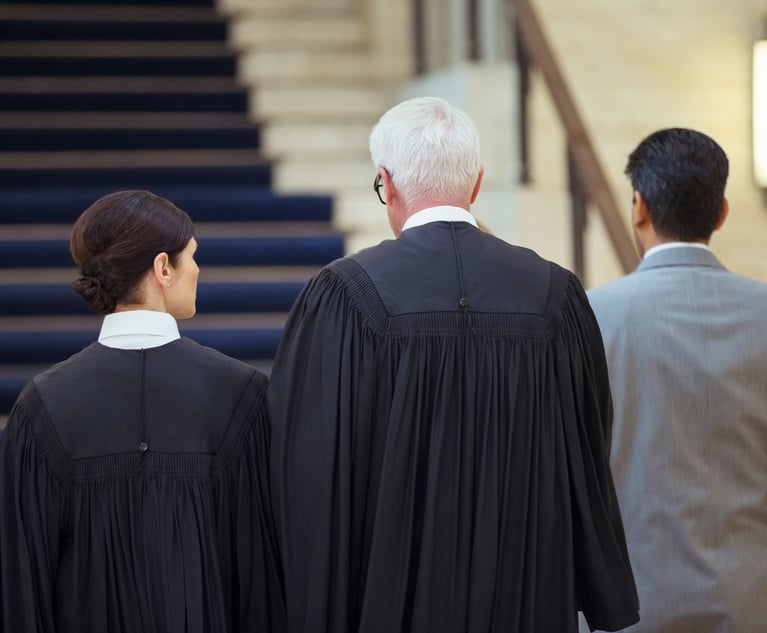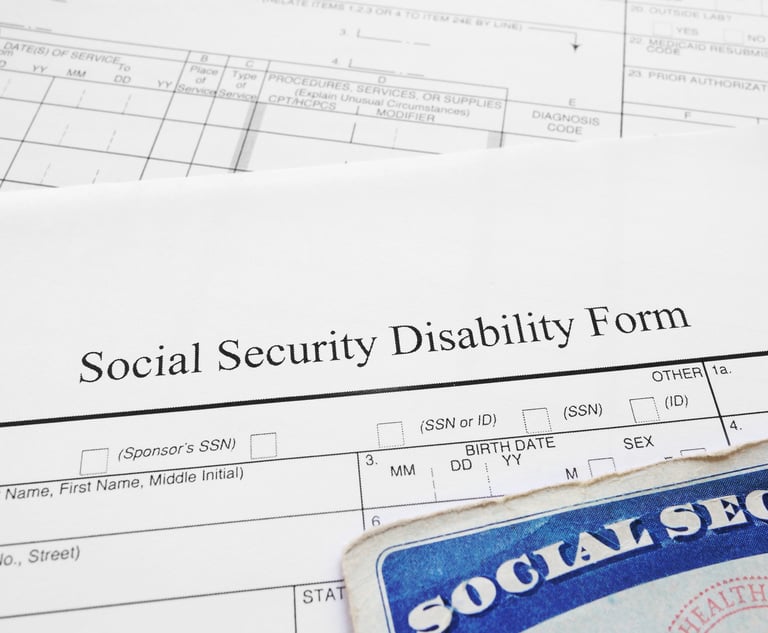Judicial Ethics Opinion 20-15
A judge need not take any further action if he/she discovered a clerical court employee's apparent misconduct after the affected case had already been adjudicated and the judge has already reported all the facts he/she learned to appropriate court administrators.
July 22, 2020 at 09:58 AM
3 minute read
The Advisory Committee on Judicial Ethics responds to written inquiries from New York state's approximately 3,600 judges and justices, as well as hundreds of judicial hearing officers, support magistrates, court attorney-referees, and judicial candidates (both judges and non-judges seeking election to judicial office). The committee interprets the Rules Governing Judicial Conduct (22 NYCRR Part 100) and, to the extent applicable, the Code of Judicial Conduct. The committee consists of 27 current and retired judges, and is co-chaired by former associate justice George D. Marlow of the Appellate Division and the Honorable Margaret Walsh, a justice of the Supreme Court.
Digest: On these facts, where a judge discovered a clerical court employee's apparent misconduct after the affected case had already been adjudicated and the judge has already reported all the facts he/she learned to appropriate court administrators, the judge need not take any further action.
Rules: Judiciary Law § 212(2)(l); 22 NYCRR 100.2; 100.2(A); 100.3(D)(1)-(2); Opinions 15-189; 13-54; 10-114; 08-99.
Opinion: The inquiring judge issued a default judgment in a particular matter after a litigant repeatedly failed to appear. The judge subsequently learned that the litigant had come to the courthouse the very day of and before the appearance at which the default judgment was entered. He/she checked in with a clerical court employee. The clerk erroneously advised the litigant he/she had not been properly served and need not appear before the judge. Based on the clerk's representation, the litigant departed. As the clerk is not the judge's personal appointee, the judge reported the apparent misconduct "up the chain of command to court administrators." [1] The judge asks if he/she need take any further action concerning the clerk and/or the affected case.
A judge must always avoid even the appearance of impropriety (see 22 NYCRR 100.2) and must always act to promote public confidence in the judiciary's integrity and impartiality (see 22 NYCRR 100.2[A]). Thus, if a judge receives information indicating a "substantial likelihood" that a lawyer or another judge has committed a "substantial violation" of the applicable rules of professional ethics, the judge must take "appropriate action" (22 NYCRR 100.3[D][1]-[2]).
On its face, "Section 100.3(D) imposes no disciplinary duties on a judge who learns of inappropriate or illegal conduct by an individual who is not a lawyer or a judge" (Opinion 15-189). We have, however, noted that "misconduct by court personnel can, under some circumstances, undermine public confidence in the integrity and impartiality of the judicial system itself" (Opinion 15-189, quoting Opinion 08-99). Where this standard is met, the judge may be required to report facts he/she has learned to the appropriate administrative or supervising judge (see Opinions 15-189 ["substantial and troubling irregularities"]; 08-99 [misconduct suggesting "the possibility of corruption within the court itself"]).
Here, of course, the judge has already reported all the facts he/she learned to appropriate court administrators. We conclude nothing more is required under Opinions 15-189 and 08-99.
Concerning the propriety of any further actions concerning this concluded case, including possibly restoring it to the calendar, such questions are primarily legal in nature and we therefore decline to address them (see Judiciary Law § 212[2][l]; Opinion 10-114; cf. Opinion 13-54 ["The Rules Governing Judicial Conduct are rules of reason; they do not ordinarily require judges to sua sponte re-open proceedings that have already been adjudicated"]).
[1] Court administrators subsequently assured the judge the issues had been addressed, without providing further details.
This content has been archived. It is available through our partners, LexisNexis® and Bloomberg Law.
To view this content, please continue to their sites.
Not a Lexis Subscriber?
Subscribe Now
Not a Bloomberg Law Subscriber?
Subscribe Now
NOT FOR REPRINT
© 2024 ALM Global, LLC, All Rights Reserved. Request academic re-use from www.copyright.com. All other uses, submit a request to [email protected]. For more information visit Asset & Logo Licensing.
You Might Like
View AllTrending Stories
- 1Call for Nominations: Elite Trial Lawyers 2025
- 2Senate Judiciary Dems Release Report on Supreme Court Ethics
- 3Senate Confirms Last 2 of Biden's California Judicial Nominees
- 4Morrison & Foerster Doles Out Year-End and Special Bonuses, Raises Base Compensation for Associates
- 5Tom Girardi to Surrender to Federal Authorities on Jan. 7
Who Got The Work
Michael G. Bongiorno, Andrew Scott Dulberg and Elizabeth E. Driscoll from Wilmer Cutler Pickering Hale and Dorr have stepped in to represent Symbotic Inc., an A.I.-enabled technology platform that focuses on increasing supply chain efficiency, and other defendants in a pending shareholder derivative lawsuit. The case, filed Oct. 2 in Massachusetts District Court by the Brown Law Firm on behalf of Stephen Austen, accuses certain officers and directors of misleading investors in regard to Symbotic's potential for margin growth by failing to disclose that the company was not equipped to timely deploy its systems or manage expenses through project delays. The case, assigned to U.S. District Judge Nathaniel M. Gorton, is 1:24-cv-12522, Austen v. Cohen et al.
Who Got The Work
Edmund Polubinski and Marie Killmond of Davis Polk & Wardwell have entered appearances for data platform software development company MongoDB and other defendants in a pending shareholder derivative lawsuit. The action, filed Oct. 7 in New York Southern District Court by the Brown Law Firm, accuses the company's directors and/or officers of falsely expressing confidence in the company’s restructuring of its sales incentive plan and downplaying the severity of decreases in its upfront commitments. The case is 1:24-cv-07594, Roy v. Ittycheria et al.
Who Got The Work
Amy O. Bruchs and Kurt F. Ellison of Michael Best & Friedrich have entered appearances for Epic Systems Corp. in a pending employment discrimination lawsuit. The suit was filed Sept. 7 in Wisconsin Western District Court by Levine Eisberner LLC and Siri & Glimstad on behalf of a project manager who claims that he was wrongfully terminated after applying for a religious exemption to the defendant's COVID-19 vaccine mandate. The case, assigned to U.S. Magistrate Judge Anita Marie Boor, is 3:24-cv-00630, Secker, Nathan v. Epic Systems Corporation.
Who Got The Work
David X. Sullivan, Thomas J. Finn and Gregory A. Hall from McCarter & English have entered appearances for Sunrun Installation Services in a pending civil rights lawsuit. The complaint was filed Sept. 4 in Connecticut District Court by attorney Robert M. Berke on behalf of former employee George Edward Steins, who was arrested and charged with employing an unregistered home improvement salesperson. The complaint alleges that had Sunrun informed the Connecticut Department of Consumer Protection that the plaintiff's employment had ended in 2017 and that he no longer held Sunrun's home improvement contractor license, he would not have been hit with charges, which were dismissed in May 2024. The case, assigned to U.S. District Judge Jeffrey A. Meyer, is 3:24-cv-01423, Steins v. Sunrun, Inc. et al.
Who Got The Work
Greenberg Traurig shareholder Joshua L. Raskin has entered an appearance for boohoo.com UK Ltd. in a pending patent infringement lawsuit. The suit, filed Sept. 3 in Texas Eastern District Court by Rozier Hardt McDonough on behalf of Alto Dynamics, asserts five patents related to an online shopping platform. The case, assigned to U.S. District Judge Rodney Gilstrap, is 2:24-cv-00719, Alto Dynamics, LLC v. boohoo.com UK Limited.
Featured Firms
Law Offices of Gary Martin Hays & Associates, P.C.
(470) 294-1674
Law Offices of Mark E. Salomone
(857) 444-6468
Smith & Hassler
(713) 739-1250










